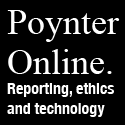RESPONSIBILITIES
You will compile a portfolio of 10 articles for the major project in this course. Students may substitute editing, art and graphics or photographic work with approval of the instructor.
One of the most important aspects of this workshop is the editorial meeting. This course tries to create a professional environment, which means that missing a weekly editorial meeting is like missing a day of work. Your participation is essential to getting the paper out each week. Attendance is mandatory unless prior arrangement is made with the instructor. This means that you must make contact with the instructor and editor in chief directly (phone, office hours, or email response) instead of simply giving notice of your absence. Any unexcused absences will drop the student’s grade a portion of a letter grade. There will be 10 sessions and three absences will result in failing the course. There are 10 issues this semester.
Meeting deadlines is also a key concern. Press time is carefully allotted to complete tasks, so they are absolutely inflexible. Furthermore, meeting your deadlines allows everyone else on the staff the time needed to complete his or her own job with the highest quality and without unnecessary stress. Be considerate of your fellow staff members—meet all your deadlines. Missing a deadline will result in your overall grade dropping a portion of a letter grade.
SURVIVAL TIPS
• Schedule your interviews early. Get appointments with sources right away.
• Do your library and computer searches shortly after receiving the assignment.
• Save your work often and back up files.
• Keep copies of your work as you work and clips after they are published.
EVALUATION
Policy Manual Honor Statement 5%
Participation 30% - 20% attendance, 5% beat/story ideas
Portfolio 50%
Mid-Semester Review 10%
Semester Review 10%
POLICY MANUAL HONOR STATEMENT
The policy manual portion will be awarded when the instructor receives your signed honor statement. You should be certain to read and understand the manual at the start of the semester even if you have read it during a previous semester.
PARTICIPATION
Participation in the course includes attendance at staff meetings, adherence to deadlines, beat coverage, peer coaching and contributions to the editorial process. Participation points will be affected for any unexcused absence or missed deadline. You may receive a warning notice and/or be asked to meet with your section editor or editor in chief to evaluate your performance for lapses in attendance or with deadlines. In the event that such a conference is requested, the focus will be to discuss ways to ensure your work is complete and timely.
Because this workshop is designed to function as a professional work experience, consequences such as notices and conferences are appropriate and should function to promote accountability. This system’s purpose is to encourage communication and provide an avenue for professional conflict management. Students who get referred to coaching must meet with a coach before they may take another assignment.
When you sign your name on the sign-in sheet at each meeting, mark whether or not you contacted or visited or talked with your beat. Developing relationships around campus and in the city is key to making sure that we cover our readership well. It’s not just about finding stories to fill the pages—we don’t want to be missing any stories!
Please remember, in a traditional classroom, your performance affects you alone. In a working publication, your commitment to meetings and deadlines affects your reputation with peers, the stress level of the staff, and the quality of the publication for the readers. Please take all necessary measures to be proud of the work you will do with The Clause this semester.
PORTFOLIO
The collection of articles, photos or artwork for this project should help you build a portfolio that you can present at future interviews for internships or employment. Keep a copy of anything you prepare for the paper during the semester, and keep clips if it is published. Note that portfolio items do not necessarily have to be published, since factors beyond your control sometimes keep them out of the paper. If you write more than 10 articles in the semester, you may choose the 8 you want to include in your portfolio or you may compile all your work.
You may include a copy of the version you turned into the editors and a copy of what was published if there are significant changes that lead you to want your original considered for the portfolio grade. Sidebars, briefs, and blurbs (like “Students Speak”) count two for one article.
The article portion of the grade will be based upon the quality of the articles, photos or artwork. These will be evaluated as a whole, taking into account the content, the style of the materials submitted, and room for growth throughout the semester. Individual grades for each story or photo will not be assigned, but the overall quality of the work will be evaluated.
Points will be awarded based on meeting each of the following requirements:
The portfolio includes at least 2 news articles, 1 in-depth piece, 2 sports pieces (at least 1 game coverage), 1 opinion piece and 4 other articles of choice. In-depth pieces will be those most often 5 pages in length (approximately according to editors’ assignment), most often assigned two weeks out, and referencing multiple sources with complete background on the topic. Stories with surveys meet this requirement. Centerspreads are most often “in-depth” and major profiles or longer opinion pieces can meet the in-depth piece. Team writing articles will not count towards the in-depth piece requirement. Please check with the adviser if you are concerned about meeting this requirement.
You can use the following list of questions to help you critique your own work.
1. Does the story have a single theme holding it together?
2. Does the lead reflect the story’s theme and importance in a clear, creative way?
3. Is the story’s development logical? Is the story well-organized?
4. Does each paragraph contain a single idea?
5. Have you included all appropriate sources for balance and fairness?
6. Have you supplemented human sources with documents for completeness?
7. Is the information accurate?
8. Is the story tailored to its intended audience?
9. Have you corrected spelling, grammar and punctuation errors, and triple-checked the spelling of all proper names?
10. Have you edited for clarity and conciseness?
PORTFOLIO DEADLINE
The portfolio and semester review must be submitted on deadline. These projects will be due at the final session. Portfolios that are late for any reason will receive a 10% reduction for not meeting the deadline. It is your responsibility to be sure your portfolio is completed and turned in by the deadline. If you are concerned that the editors are not assigning you enough stories, please discuss this with your editors and adviser early in the semester. Alternative assignments may be given outside of the articles generated from editorial meetings.
When you compile your portfolio, the goal is to look professional. To this end, portfolios will be turned in electronically, in the form of a PDF file consisting of scans of print articles and PDF-saved copies of online articles. Each portfolio should begin with the Semester Review, followed by a Table of Contents page before the articles. There is no need to place any dividers between articles. The portfolio must be e-mailed to the instructor prior to the last course meeting.
Scan equipment is available in the graphic center where images can be saved as either PDFs or JPGs. For Table of Contents and Semester Review pages, Word can convert documents to PDFs. After each file is properly converted, use Adobe Acrobat to compile everything into one PDF file. Acrobat is available in the graphics center and on all Clause computers.
MID-SEMESTER REVIEW
At the mid-semester point, you will briefly meet with the editor-in-chief and the faculty adviser to discuss your performance. This meeting will occur in an informal setting and take approximately 20 minutes or less. Grading for this occurs on a pass/fail.
SEMESTER REVIEW
The semester review is a reflective essay, 2-3 pages in length, addressing questions related to the workshop and your growth in the semester. This assignment will allow you to process the experience some and draw conclusions about it. It will be graded based upon providing a complete response to the questions provided here.
SEMESTER REVIEW QUESTIONS
For the end of the year, I would like to gather feedback specific to The Clause as an organization on campus. Please direct your critique for the first and second questions to practical and philosophical areas that maintain.
1. What things are going well with the paper?
2. What needs to change or be added to the world of The Clause? Areas to consider: meetings, reporting process, editing, staff dynamics, adviser’s impact, coverage, beats…
3. What about you and The Clause? Share your thought-out comments but not any fluff to fill up pages for an assignment. What have you realized about yourself through being on staff? How did you make The Clause a better publication?
The Pub Hub
A Resource for Student Publication Workshop
Welcome to the Pub Hub
On your semester long quest to become professional reporters, editors or photographers, this site provides easily accessible tools of the trade. Confused about film reviews, need a refresher on leads, or looking for writing samples, it's all here, along with class documents (just in a case they get lost).

